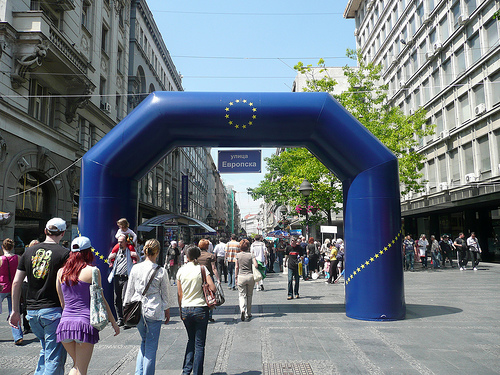“By the time we can join, the EU won’t even exist.”

On January 21st 2014, the European Union began formal negotiations with Serbia regarding the Balkan country’s possible ascension to the EU. Since February of 2012, Serbia has been a formal candidate for EU status, but it has taken an additional two years for ascension talks to officially begin. The opening of these negotiations has been greeted with –at best- muted optimism within Serbia. It is well known that the road to EU membership is a long one, with the first Stabilisation and Association Agreement (SAA) having been signed in 2007. This agreement was itself the result of many years of negotiations, with the issue of EU ascension seeing almost universal support within Serbia for the early part of the last decade.

Since the signing of the SAA agreement, further steps towards ascension have been contingent on economic reforms as well as the capture of notorious war criminals Ratko Mladic and Goran Hadzic, both of whom were finally arrested in 2011 after spending almost two decades as fugitives. With the implementation of market reforms and the capture of Europe’s most heinous war criminals, the Serbian government has displayed a genuine and concerted effort to join the European community. However, since the issue of EU membership was first brought to the fore of Serbian politics, the prospect has begun to look substantially less appealing. In the time that Serbia has been able to make progress towards joining the EU, crises within Italy, Ireland, Portugal and (particularly) Greece have created a tense political atmosphere in Brussels. The threat of austerity and the general economic struggles of member nations no longer make EU membership the golden ticket to development that it once was. As such, public support for EU ascension has steadily dropped from 80% in 2001 to only 41% in 2012. The road ahead is still long, and even the most optimistic (Serbian) projections do not foresee the country becoming a full member before 2018, or (more realistically) 2020.
There has been a long-running joke within Serbia for the last decade regarding eventual EU membership, that “by the time we can join, the EU won’t even exist.” If there is any single line that can hope to summarize the Serbian attitude towards these developments, it is that one. The beginning of these negotiations has provided an opportunity for optimistic headlines across global publications, but it has provided precious little else. It is a step forward, but only that. Even with a step towards Europe, the road to Brussels still stretches thousands of miles from Belgrade. By now the question has become: by the time Serbia gets there, what will they find?
